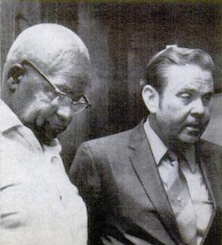 Whenever my work involves looking at rolls of decades-old microfilm, I inevitably stumble across a handful of tremendous yarns that have been lost to time. Such was the case this past Saturday, as I whiled away the hours scrolling through old copies of The San Diego Union-Tribune. Lazily panning across the pages in search of a few relevant scraps of info, I fortuitously encountered the strange story of Lonnie Cross. In 1935, Cross got in a violent argument with his girlfriend, and a Good Samaritan named Edward Bozier tried to break up the altercation. The incident ended with Bozier dead from a stab wound to the skull, and Cross on the run—for the next 37 years. That stretch on the lam ended, however, when Cross suddenly decided to turn himself in:
Whenever my work involves looking at rolls of decades-old microfilm, I inevitably stumble across a handful of tremendous yarns that have been lost to time. Such was the case this past Saturday, as I whiled away the hours scrolling through old copies of The San Diego Union-Tribune. Lazily panning across the pages in search of a few relevant scraps of info, I fortuitously encountered the strange story of Lonnie Cross. In 1935, Cross got in a violent argument with his girlfriend, and a Good Samaritan named Edward Bozier tried to break up the altercation. The incident ended with Bozier dead from a stab wound to the skull, and Cross on the run—for the next 37 years. That stretch on the lam ended, however, when Cross suddenly decided to turn himself in:
Cross limped into the Duval County Sheriff’s Offfice Wednesday night and said he wanted to “get right with the Lord” by confessing to killing a man 37 years ago.
In a jail interview yesterday, Cross said he had lived in New Orleans under the name Richard Mosley since 1937…Cross said he fled to Savannah [after the murder], but met too many people who knew him and went to New Orleans. A longshoreman in Jacksonville and Savannah, he followed the same trade on the banks of the Mississippi River until an auto accident on Canal Street…
“I think God blessed me that I didn’t get killed,” he said. “I didn’t get religion right then, but one day, just like laying down my coat, my conscience came up on me. The thoughts of the Lord came on me.”
Only recently, he said, the spirit of the Lord moved him to clear up his old trouble. “It said, ‘You’ll feel better to clear this up,’ and I feel better.” Cross said. “I’m bound by four walls in this jail, but it is up to the Lord whether I will go free again.”
Despite Cross’s confession, he was freed from jail after a few weeks and suffered no further punishment. A big reason for that was the fact that the police couldn’t find any corroborating evidence; everyone from Cross’s Casketville days was either dead or gone, and the police hadn’t bothered to retain any physical evidence.
Cross’s tale brings up a lot of issues regarding the philosophy of state-mandated punishment. It seems like he was let off the hook because of his religious conversion. But many incarcerated criminals have claimed similar spiritual transformations—why do they tend to be treated more disdainfully by the system? And is a guilty conscience really as grave a punishment as the loss of physical freedom? Edgar Allen Poe might have thought so, but I reckon that most everyone else will disagree.


Jordan // Dec 7, 2010 at 11:02 am
Well, there are certainly those who thought that the point of physical incarceration was to induce a guilty conscience. Lots of time to sit and think about what you’ve done. Obviously that doesn’t always work, but it’s one theory of punishment.
Captured Shadow // Dec 7, 2010 at 1:24 pm
Lots of nuts confess to murders that they didn’t do. The courts need to have some evidence beyond the confession to convict and it sounds like they didn’t in this case. It sounds to me like he was let go, not because of his conversion, but because there was a reasonable doubt that he did it.
Brendan I. Koerner // Dec 7, 2010 at 1:31 pm
@Captured Shadow: Yeah, that was definitely the contention from the district attorney–that there just wasn’t any remaining evidence or witnesses, and that the confession alone wasn’t sufficient to overcome reasonable doubt.
That said, he was indicted for the murder in ’35, and his girlfriend does seem to have made a statement at that time. I can’t help but feel that the fact that Cross made for such a good story helped affect the DA’s decision not to pursue the case. (Also, the fact that no one in the community was clamoring for justice.)